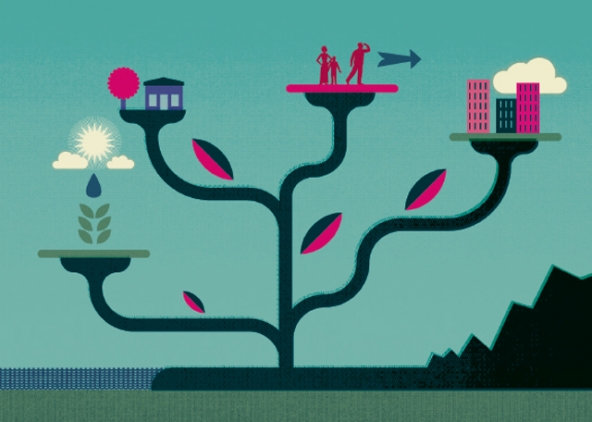It is all too easy to confuse the evidence of prosperity with its cause. An educated population, access to capital and sound financial markets, a diverse and productive labor force, innovative businesses, and general material abundance are surely hallmarks of a prosperous society. Yet these features merely describe prosperity. They do not explain it. These features can only come about in a society in which the political institutions defend the individual rights and liberties of its members. Freedom, undoubtedly, is what enables societies to flourish.

Because it is the political structure that is charged with defending liberty, wealth creation or economic growth will only go as far as the political structures allow. Political institutions that allow for a free flow of ideas, goods, and people, will become better off than those that suppress them. In “Why Nations Fail”, Daron Acemoglu and James Robinson point out that “inclusive” institutions encourage greater prosperity than “extractive” institutions. Inclusive institutions that enforce property rights for all members of society is more conducive to economic growth than institutions that extract resources from the many by the few. The legal, economic, and social systems must cater to the promotion of freedom for all in order for prosperity to be sustained for any.
From a philosophical standpoint, societies that allow freedom to innovate on an individual level is key to market innovation on the macroeconomic level. This can happen, though, when knowledge and ideas can be exchanged freely. Indeed, societies that fear change and the free flow of ideas stagnate a society. In his book, “On Liberty,” John Stuart Mill’s argument for individualism and freedom of speech are paramount to the prospering of a nation. He writes, “The despotism of custom is everywhere the standing hindrance to human advancement.” The key to a thriving economy is honoring the rights of individuals to pursue their own interests without violating the rights of others.
Prosperous societies see the importance in letting individuals succeed, and, alternatively, fail. Protecting individuals from failing is a disservice to society, as it does not convey the essential information needed to succeed. Provided they do not violate the rights of their fellow men and women, people should be free to grow from their own blunders, gambles, and adventures without asking any sort of permission.
A champion of liberty, Leonard Read, credits this form of personal responsibility as one of the most important virtues, which should not be given to anyone else, including a government. He claims that when an individual turns responsibility of self over to another, or if the government takes it for you, the extent of that removal is the elimination of the very essence of one’s being. Not only will a loss of personal responsibility hinder individual liberty, but as Mill warns, it may stagnate the advancement of society as a whole.
Furthermore, an inclusive institution in which all people are allowed to do as they wish with their labor and knowledge is necessary for the sustained opulence of a society. Nothing should suppress a person wanting to create an enterprise that creates a product of any kind to trade with anyone. Allowing the free market to decide which products are valuable is not only efficient but also spreads information that promotes societal prosperity. Having a strong financial system, backing the free market, in which contracts are protected and enforced by the rule of law will, certainly, further the progress of the economy. This results in having sound money and the ability to attain capital, in addition to preventing both consumers and producers from abusing each other.
Moreover, profits resulting from a producer exchanging with consumers should go to the owner of the enterprise who took on the risk of obtaining capital, and no one else. Alternatively, extractive institutions would limit what the enterprise can or cannot produce and literally extract the fruits from the individual producer. This is not the idea behind a free market economy, but from a centrally planned economy. Planned economies inhibit economic growth because the incentive for producers to reap the fruits of their labor are gone.
Countries like North Korea, Colombia, Egypt, Cuba, and the former Soviet Union, exemplify the nature extractive institutions as they have exploited their people economically, socially, and politically, leaving them impoverished and stagnant. However, inclusive systems do not necessarily equate to prosperity. Many regimes, like those listed above, rose to power through popular elections as liberal reformers but deteriorated into dictatorships. Failing to implement economic freedom, resources were eventually distributed according to political connections rather than economic considerations under a price system.
By way of illustration, though a number of factors played their part in the decline of the Roman Empire, much is attributed to the rise of the welfare state. Dr. Howard E. Kershner’s “First Law” says, “When a self-governing people confer upon their government the power to take money from some and give it to others, the process will not stop until the last bone of the last taxpayer is picked bare.” When a very inclusive political system caters to the popular idea of redistribution and more government control over resources, incentives to produce for economic profit diminish as the masses seek to make coercive political profits.
Behind a prosperous nation is a set of political and economic institutions that promote individual liberties and defend property rights. Governments that are limited to protecting these rights, help cultivate a culture that empower its peoples to take responsibility over their own pursuits and successes. When left to their own devices, individuals will find innovative ways to provide value to their fellow man, which inevitably brings prosperity to the society as a whole.
